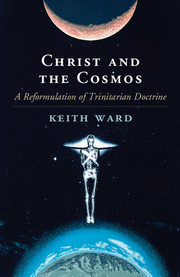Book contents
- Frontmatter
- Contents
- Preface
- Acknowledgements
- PART I THE THREEFOLD NATURE OF THE DIVINE BEING
- PART II THE BIBLICAL SOURCES OF TRINITARIAN THOUGHT
- PART III THE TRINITY, IMMANENT AND ECONOMIC
- PART IV THE SOCIAL TRINITY
- 22 Persons and Substances
- 23 The Idea of a Personal and Free Creation
- 24 The Logical Uniqueness of Persons
- 25 The Divine Nature and Freedom
- 26 Freedom in God and in Creatures
- 27 Persons as Necessarily Relational
- 28 An Ontology of the Personal?
- 29 Intra-Trinitarian Love
- 30 Infinite Gods
- 31 Divine Love and Necessity
- 32 Love and Alterity
- 33 Trinity versus Monotheism
- 34 The Passion of Christ
- 35 God and Abandonment
- PART V THE COSMIC TRINITY
- Bibliography
- Subject Index
- Name Index
30 - Infinite Gods
from PART IV - THE SOCIAL TRINITY
Published online by Cambridge University Press: 05 September 2015
- Frontmatter
- Contents
- Preface
- Acknowledgements
- PART I THE THREEFOLD NATURE OF THE DIVINE BEING
- PART II THE BIBLICAL SOURCES OF TRINITARIAN THOUGHT
- PART III THE TRINITY, IMMANENT AND ECONOMIC
- PART IV THE SOCIAL TRINITY
- 22 Persons and Substances
- 23 The Idea of a Personal and Free Creation
- 24 The Logical Uniqueness of Persons
- 25 The Divine Nature and Freedom
- 26 Freedom in God and in Creatures
- 27 Persons as Necessarily Relational
- 28 An Ontology of the Personal?
- 29 Intra-Trinitarian Love
- 30 Infinite Gods
- 31 Divine Love and Necessity
- 32 Love and Alterity
- 33 Trinity versus Monotheism
- 34 The Passion of Christ
- 35 God and Abandonment
- PART V THE COSMIC TRINITY
- Bibliography
- Subject Index
- Name Index
Summary
John Leslie has propounded what seems to me an interesting and powerful reductio ad absurdum of the argument that God has to create another ‘person’ within the divine being. He argues that there must be an infinite number of perfect Minds, since the more Minds there are, the more experiences of good there are (Leslie, 2001). If you think it is better to have many happy people than to have just one, you may be impressed by this argument. But it would seem to follow that the Father should generate an infinite number of Sons – and an infinite number of daughters too. The Holy Family must be infinitely large. Swinburne suggests that three is enough, but surely the more the better, and God must be as good as possible. An infinity of Gods (or of ‘persons’ in God, if you like) is better than just one, or just three, and there would be much more love to be given, received, and shared.
Most people instinctively feel there is something wrong with such an argument. But what is wrong with it? Leslie's argument depends upon the axiom that the more good things there are the better. He would then have to adopt the Leibnizian Rule that God must create the best of all possible worlds. So God must create an infinite number of good things, and an infinite number of other Gods. Or, to put it another way, as Leslie puts it, God must be a member of an infinitely large class of Gods. The argument seems valid – but only if you accept the Leibnizian Rule. That rule, however, can be denied in two main ways. First, there may not be such a thing as ‘the best possible world’. There may just be an infinite number of different forms of goodness, and since there is no such thing as an actually infinite number of things, it is logically impossible for God to create all those goods. God will have to create a definite number of good things. Therefore God cannot create the ‘best possible’, since there is always at least one more thing that God could have created, whatever finite number of things God does create.
- Type
- Chapter
- Information
- Christ and the CosmosA Reformulation of Trinitarian Doctrine, pp. 188 - 190Publisher: Cambridge University PressPrint publication year: 2015



